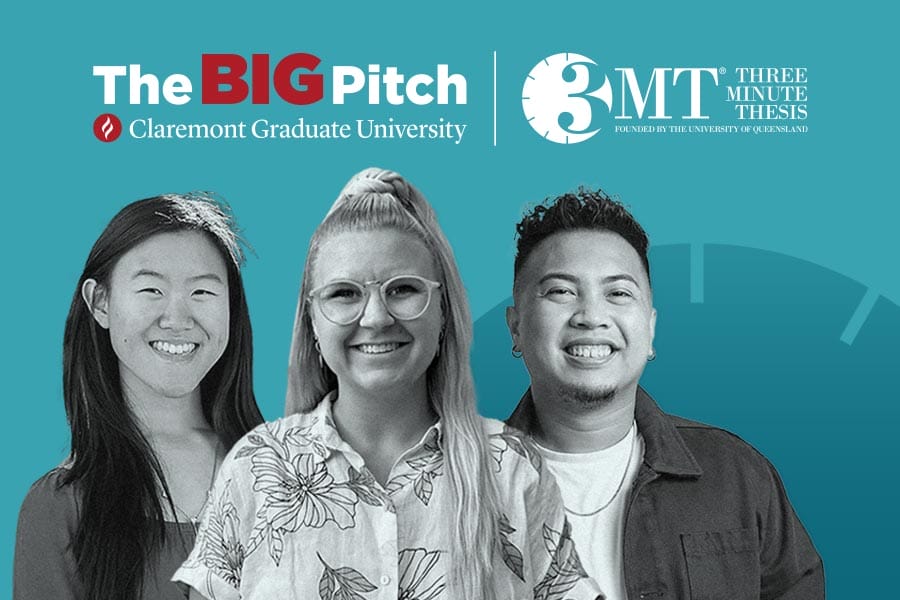Turning Years of Research into Three Minutes: Meet the Winners of The Big Pitch

You have just three minutes to explain the most important research of your life in an engaging and entertaining way for an audience that most likely has never given the topic one thought. As the timer starts, does the anxiety kick in, or do the hours of preparation and practice take over?
“For some, public speaking is very stressful and overwhelming. You need to deescalate your anxiety about that so you can focus strictly on the pitch itself.”
The Big Pitch’s 2022 first-place winner, Arline Votruba, knew exactly what she needed to do to ease her anxiety and focus on storytelling.
Her topic, Cultural Factors Influencing the Delayed Diagnosis of Endometriosis, was taken directly from the research she is focusing on for her PhD dissertation. Combining her own story with her research won her the Audience Choice award, along with the $1,000 top prize.
Votruba grabbed the audience’s attention in the first 10 seconds with a strong and lively hook: “Before having deep excision surgery in 2021, I was nauseated with severe cramps.”
“The best pitches tell a story, and you might have all the makings of The Big Pitch.”
At least that’s what Marcus Weakley, director of the Center for Writing & Rhetoric, said. He runs The Big Pitch, a challenge for graduate students to concisely convey the significance and sophistication of their research to a non-specialist audience.
Modeled after Australia’s University of Queensland Three-Minute Thesis Competition, The Big Pitch provides students the opportunity to present a professional or academic project in three minutes using only one PowerPoint slide.
“How do I condense [my research] down to three minutes?”
That was the question third-place winner Jaymes Paolo Rombaoa, a PhD student in psychology, asked himself when he decided to participate. Rombaoa spent the past three years studying the life phase transition from childhood to adolescence and adulthood.
Rombaoa’s pitch focused on the study he conducted on the daily lives of first-year college students during the first year of the pandemic. He found that emotion regulation behaviors are linked to higher levels of well-being, and interacting with others made that regulation more likely to happen. When asked how he turned research data into a story, he described his research as a big set of Lego blocks that had to be put together. “The Big Pitch was able to help me get all of that together and tell a story out of the Lego blocks.”
One of the biggest challenges participants faced was turning their data into a story with a beginning, middle, and end. Rombaoa credits CGU’s rigorous statistics and methods courses with helping him make sense of the data from his research.
“The Big Pitch helped me find details about my research which are applicable to anyone and summarize everything I’ve worked on.”
Second-place winner Shine Kim, a PhD student in Education, said The Big Pitch will help her dissertation proposal defense.
Kim spent weeks preparing, rewriting, and practicing her pitch to summarize three years’ worth of research. She conducted research on academic victimization across higher education, which she defines as “varying intensities of harassment that occur between two parties that have a power imbalance at universities.” While the responsibility to prevent victimization typically falls on students, Kim’s research will focus on interviewing both students and faculty to find out what is essential for a cooperative working relationship.
After pulling details from her research to draft her pitch, Kim met with Weakley five times to perfect her presentation “to give me the accountability I needed.” The advice was invaluable. Together, they went over everything from choosing the shortest words to use during her pitch, to practicing hand movements that engage an audience.
“Memorizing a pitch is one thing, but practicing it was something else,” Kim said. All three winners agreed that perfecting their pitches involved intense practice, with Rombaoa saying that he choreographed his pitch down to every wave of his hands. The reward was worth the work.
“Competing in The Big Pitch reinvigorated me in my research. It allowed me to think about how my project fits into scholarship, how it serves me to do this project, and how it serves those that I hope benefit from the project.”
Winning The Big Pitch reminded Votruba that her research project extends far beyond just herself.
If you’d like to learn more about these three presentations, you can watch The Big Pitch’s 2022 finals here. To support The Big Pitch 2023, contact Marcus Weakley.